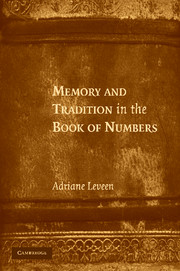Book contents
- Frontmatter
- Contents
- Acknowledgments
- ONE Desert Bound
- TWO Weaving by Design
- THREE Priestly Purposes
- FOUR Variations on a Theme: Shaping Memory in the Wilderness
- FIVE Crisis and Commemoration: The Use of Ritual Objects
- SIX Falling in the Wilderness: The Politics of Death and Burial
- SEVEN Inheriting the Land
- APPENDIX A The Priestly Sphere of Activity in the Book of Numbers
- APPENDIX B The Use and Variation of God's Address to Moses and to Aaron
- APPENDIX C Death Reports
- APPENDIX D Proper and Improper Treatment of the Dead
- Notes
- Bibliography
- Index
- Scriptural Index
- Selected Hebrew Index
FOUR - Variations on a Theme: Shaping Memory in the Wilderness
Published online by Cambridge University Press: 21 July 2009
- Frontmatter
- Contents
- Acknowledgments
- ONE Desert Bound
- TWO Weaving by Design
- THREE Priestly Purposes
- FOUR Variations on a Theme: Shaping Memory in the Wilderness
- FIVE Crisis and Commemoration: The Use of Ritual Objects
- SIX Falling in the Wilderness: The Politics of Death and Burial
- SEVEN Inheriting the Land
- APPENDIX A The Priestly Sphere of Activity in the Book of Numbers
- APPENDIX B The Use and Variation of God's Address to Moses and to Aaron
- APPENDIX C Death Reports
- APPENDIX D Proper and Improper Treatment of the Dead
- Notes
- Bibliography
- Index
- Scriptural Index
- Selected Hebrew Index
Summary
Again and again memory keeps its attention riveted on the present, even on present and future conduct.
Nearly at journey's end two of the tribes of Israel – the Reubenites and Gadites – suddenly approach Moses without warning to demand land on the other side of the Jordan. No vignette in the Book of Numbers better conveys the pronounced importance of memory to its continuing concerns than in the curious negotiations conducted by the two tribes with an increasingly furious Moses. One can imagine that Moses would find this new crisis to be a particularly cruel one, as it occurs so near to the borders of the promised land and so close to his own death. Undaunted, the Reubenites and Gadites approach Moses, Eleazar the priest, and the chieftains of the community to request the lands of Jazer and Gilead, excellent lands for cattle. “Ataroth, Dibon, Jazer, Nimrah, Heshbon, Elealeh, Sebam, Nebo and Beon – the land that yhwh has conquered for the community of Israel is cattle country and your servants have cattle” (Num. 32:3). Each and every foreign place uttered in this speech must surely gall and provoke Moses. Each is located on the wrong side of the Jordan, outside the boundaries of the land to which the Israelites are headed. In fact, the Reubenites unwittingly emphasize the point when they beseech Moses: “Do not move us across the Jordan” (Num. 32:5).
Information
- Type
- Chapter
- Information
- Memory and Tradition in the Book of Numbers , pp. 65 - 96Publisher: Cambridge University PressPrint publication year: 2007
